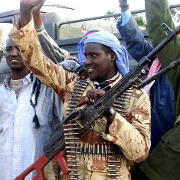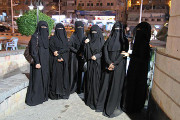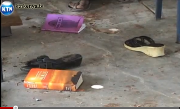Hostility toward converts from Islam shadows refugees to neighboring country.
By Simba Tian
NAIROBI, Kenya, November 17 (Compass Direct News) – One Christian left his native Somalia 10 years ago and another fled as Muslim extremists were bombing his house earlier this year, but both Somali converts from Islam feel they are still in danger in Kenya.
In February, Islamic extremists from the al Shabaab militia fighting for control of Somalia reduced Mohammed Abdi Mose’s house in Mogadishu to ashes as he evacuated his family, the 54-year-old father of seven told Compass. His head bears a scar where shrapnel struck, and he requires medicine to limit the injury’s damage to his memory.
“It was midnight, and it was raining,” he said. “No moonlight; no light; I said, ‘We are moving.’ Amid the bullets and mortar shells, I had four kids on me, and my wife had three kids on her, with the older boy and girl walking – the smaller ones were on us.”
About 150 people died that night in military fighting, but Mose said it was no accident that his house was targeted. Earlier that month the Muslim extremists, who had suspected he was a convert to Christianity as he had worked for Christian Non-Governmental Organizations (NGOs), confirmed that he had come to faith in Christ and was therefore worthy of death. They tied his hands behind him and began hitting him with sticks and metallic objects, he said.
He sustained a deep cut on his heel. They stomped on his stomach, damaging his urinary system, he said. Neighbors who heard his cries came out in large numbers, forcing the attackers to flee. Mose said he knew then it was time to relocate.
After spending a month with neighbors recovering from his injuries, he and his family fled to Lower Juba in March, then to Kismayo. Kismayo is al Shabaab’s economic lifeline, where the extremists receive goods by ship, as well as ransom money from piracy. The Kenyan military has besieged the port town in an effort to flush out the militants after they were blamed for a spate of kidnappings of foreigners inside Kenyan territory.
Closely monitored by al Shabaab in Kismayo, the family headed toward Kenya in April, renting a donkey to carry their luggage and youngest child, 4 (their oldest, a daughter, is 19). Mose said it took them 18 days to traverse the 370 kilometers (230 miles) to Liboi, the border town on the Kenyan side, where the donkey died of exhaustion. They still had 100 kilometers (62 miles) to go to reach refugee camps in Dadaab.
For the next six months, the family lived in the Ifo refugee camp in Dadaab, where people flow freely in and out of the camp, including al Shabaab members in civilian garb. In September, Mose said, some al Shabaab members in the camp threatened to kill him. Somali Christian contacts in Kenya helped Mose move his family away from the border last month.
Having worked for NGOs while in Somalia, Mose became a target as al Shabaab sees the organizations as either Christian or spies for the West, he said. That reputation has followed him, subjecting his family to discrimination not only from the militants but also from other Somali Muslims; the threat continues in his undisclosed location in Kenya, which is more than 82 percent Christian with a Muslim population of 8.32 percent, according to Operation World.
Mose’s wife bakes and sells bread to try to feed the family. She is due to give birth in January – to twins – and the family fears she may be unable to continue her micro-enterprise. Mose, meantime, said he is still in pain.
“At the moment, I cannot do heavy work,” he said. “I have a lot of pain in my lower abdomen which needs medical attention. My back is also not good. Indeed our situation is not promising, especially taking care of a family of nine as a refugee. If we get asylum, then it will save my family.”
Threatened
Another Somali convert from Islam arrived in Kenya in 2001, but he and his family also are seeking a third country after Muslims in Nairobi recently posted his photo in a mosque, accusing him of being a threat to Islam.
The Muslims of Nairobi’s Somali enclave in Eastleigh found out that Adam Musse Othman, 60, had translated biblical portions into Maay, one of the Somali dialects, and they also got hold of a copy of the Jesus Film that Othman had translated into Maay; they were able to identify the voice-over in the film as his, he said.
Othman said he was not safe from Islamic extremists in Nairobi who told him by phone that they were aware of his involvement in the production of the Christian film and the translation of biblical passages into Maay.
“I cannot take such threats lightly, hence my request for resettlement on security grounds where we can live peacefully, decently and freely – also, to save ourselves from death and violence,” he said.
Othman, who walks with the aid of a cane and said he is suffering from various ailments, said he has made several applications to the United Nations High Commissioner for Refugees for resettlement and is awaiting a reply.
“I feel that our case needs urgent attention, given the current situation surrounding our well-being,” he said. “With the increasing radicalization of Islam in Somalia, and the potential spillover effects into Kenya, I feel unsafe living in Kenya with my family.”
Othman said his absence from mosque prayers had led his Muslim friends and relatives to shun him and his family.
“There are no cordial relations between us, and I have received several threatening phone calls and short text messages in my phone by people who claim to know that I am a Christian,” he said. “I have reported this matter to Pangani police station. The threats to me and my family from Islamic radicals are still haunting me here in Nairobi. There are people who know me and my family and are suspicious of my faith. When my wife visits Eastleigh, she has to cover her face to avoid being identified.”
Othman left Somalia fearing either the civil war or those hostile to his Christian faith would kill him, he said.
“The current situation in Somalia, the emergence of al Shabaab and the introduction of sharia[Islamic law], makes it unthinkable that I can ever return to Somalia,” he said.
He worked as medical liaison officer with a Christian NGO based in Mogadishu between 1992 and 1995; later his family moved to Baidoa when the war intensified.
“That kind of work proved dangerous to me since I started getting threatening phone calls from Islamic extremists,” he said. “I also felt that some members of my sub-clan who knew about me were not happy, judging from the way they constantly challenged me to state my spiritual standing since I was working with a Christian NGO, and this made me feel highly insecure.”
At first he did not take the threats seriously, he said. But then Islamic extremists shot dead his cousin, Abdi Washed, a Christian, in Mogadishu in 1994, and shortly thereafter three friends were killed at Bakaro Market in Mogadishu.
“The killings were carefully planned assassinations,” he said. “I was then warned by my close friends and relatives that I was next in the list of Christians targeted for assassination.”
Heavy fighting in Baidoa made it difficult for Othman to cross into Kenya. He was able to leave Somalia by air in 2001, and the following year his family joined him after traveling on foot and by bus.
Previously he had worked in Yemen with a Christian group, he said, arriving there in 1986 after completing theological studies abroad. It would prove to be one of his first experiences with people hostile to Christianity.
“Some people unknown to me reported to the Yemeni authorities that I was a Christian,” he said. “I was arrested and imprisoned for nine months that year at Sana’a Central Prison.”
END
**********
Copyright 2011 Compass Direct News

.jpg)
.jpg)






